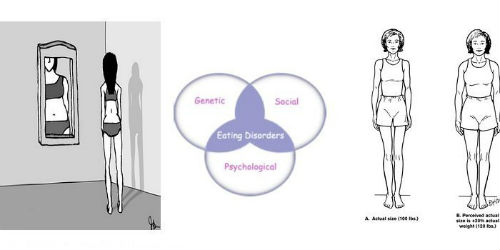
If you are affected by anorexia nervosa, this site aims to provide relevant, up-to-date information to help make life a little easier. If someone you care about is affected, then you will be able to obtain a greater understanding of how best to support and encourage your loved one in their recovery journey.
One of the more obvious anorexia nervosa facts is that it is one of the most dangerous of all mental health conditions because it has an incredibly high mortality rate. In fact, studies have shown that of all psychiatric illnesses, the mortality rate from anorexia nervosa is the highest. 20% of people who suffer from anorexia nervosa will die at a premature age as a result of their illness. This eating disorder affects about one in every hundred females, and one in every ten sufferers is a male. Anorexia is not about food – the behaviors surrounding food are a symptom of a deeper problem. While an eating disorder is the result of multiple factors, genetics do play a role and research shows that relatives of people who suffer from anorexia are more than 11 times at risk of suffering from the condition than those with unaffected relatives.
According to Steinhausen (2002), research into recovery has identified that around 46% of people with anorexia recover fully, one third improve, and 20% remain chronically unwell. It most commonly begins in adolescence, but cases as young as 5 years old and over 70 have been seen.

Eating disorders have long since been viewed, particularly by many health professionals, as very difficult and complicated conditions to treat. This often goes on to have a negative effect in terms of how those suffering from anorexia are treated. I believe you have to separate the person from the illness and remember that even if you have this diagnosis you should not be viewed and labelled as ‘anorexic,’ but as a person in your own right with very valid feelings, expectations, hopes and dreams for life who happens to be affected by the illness. Too often, it can become an identity where the person is left struggling to see any alternative.
Anorexia Support

Whether you are newly diagnosed or have suffered from a severe and enduring eating disorder, it is so crucial to remember that it is a treatable and manageable illness. There is always hope for recovery and although it is by no means simple or easy, you don’t have to go through it alone. There is much support available, both online and in various groups, such as Orange County Intergroup of Overeaters Anonymous. As each person is unique, so is the individual journey from illness into recovery and beyond. This site will be looking into various treatment centers offering intensive treatment, as well as day-patient, outpatient and alternative treatments.
Share Experiences
Sometimes it is too hard to even imagine what life could be like without an eating disorder. The fear of the unknown and how to cope with everyday life can seem truly too overwhelming to contemplate. If you, or the person you wish to support find yourself at this stage, it is especially important to be aware that this stage is completely normal and most people who go on to find freedom and recover will have felt exactly the same. One thing I have learned is that there are no quick fixes to recovery and that old chestnut of if it sounds too good to be true, then it usually is…this is partly why I am so passionate about sharing what myself and those close to me have experienced as beneficial, as well as what treatments can be rather negative, or at worst triggering. You may find it difficult to talk to a loved one, so it can place a strain on your marriage or relationship.
Anorexia Triggers
Whilst on the subject of triggers, this Orange County therapy post aims to avoid anything (as much as possible) that could result in a person being triggered. For this reason, I will not mention any numbers or sizes and will not post any comments that include such details. Recovery is challenging enough without having the anorexic brain frantically doing maths calculations each time someone mentions weight and this is why I no longer read certain magazines which are predominantly diet or weight loss focused. Although it is impossible to completely eliminate triggers from our life, it is very important, particularly when you are feeling vulnerable and/or in the early days of recovery to ‘keep it simple’ and avoid reading certain magazines or watching weight-focused TV programs if this is an issue.

Isolation & Anorexia
As anyone who has anorexia will know only too well, the condition thrives in secrecy and isolation. This is another reason why I have sought to create a post where connections can be made and the emptiness and loneliness that so often surrounds this destructive eating disorder can be overcome. We all have so much to offer and this sadly can get forgotten or pushed aside when the illness takes more and more control of our lives. In addition, time can seem to stand still if your illness takes hold whilst at school or university, making it even more crucial to find like-minded people who understand where you are at and the skills, tools and support required to move forward.
Finally, I hope that that these anorexia facts have helped, and in time we will be able to support and encourage each other through sharing our growth, knowledge, skills and invaluable experiences on the path of recovery. Many people I have met in treatment have incredible artistic souls and the more we invest in creative outlets the stronger emotionally we can become. I look forward to hearing your experiences and learning from each other how to remain a true freedom from fear.
What Are the Effects of Anorexia on Health?
There many different effects of anorexia on health, some of which are severe and indeed dangerous. In order to bring the message home about how severe associated complications may be, some of these will be examined along with their related symptoms.
Muscular System Function
Every muscle in the body is very much affected by the action of starvation; even the heart muscle can be severely affected and can decrease in size. Muscles in the body will begin to waste away, and this is also unhelpful to the anorexic’s already distorted Body Image; it results in the muscles looking untoned or flabby in appearance. In cases of extreme starvation, even walking or standing may become increasingly difficult due to muscle wastage in the legs and torso areas. As with the vast majority of anorexia health complications, the way to recover muscle wastage is to restore body weight to a healthy body mass index (BMI).
Nervous System
This is made up of the brain, nerves and spinal cord, and as it is the brain that is most severely impacted by starvation that will be solely examined. As the brain relies solely on sugar or glucose (half of all the glucose the body makes is taken up by the brain) to function it is unsurprising that this is so badly affected. Some of the main complications may include brain shrinkage, reduction of blood flow to the brain, and physical damage.
When the brain is deprived of essential energy or glucose, a whole host of cognitive difficulties may occur. Further key signs and symptoms include concentration problems, depression, apathy, distorted thinking, forgetfulness, anxiety, rituals, and problems undertaking mental tasks and reasoning.
Integumentary System
This includes skin, hair and nails. Some of the main complications of starvation upon the integumentary system include lanugo (fine hair on skin/face), scars, bruising and skin discoloration. Hair becomes increasingly dry and may begin to fall out, and nails become very brittle and skin may eventually appear much older as starvation takes its toll. Further key symptoms include very dry skin, calloused knuckles (through purging), yellow skin and hair thinning.
Cardiac Complications
The effects of both malnutrition and starvation can have severe implications to a person’s heart. These anorexia health damage include low heart rate (bradycardia), decreased blood pressure, irregular heartbeat, heart murmurs, heart attacks, congestive heart failure and re-feeding edema. Malnourishment also causes the heart muscle to weaken and may even result in the heart shrinking. The irregular heart beat is a result of electrolyte imbalances caused by dehydration from vomiting or restricting food. Symptoms of cardiac problems to be aware of include chest pain, shortness of breath, dizziness, weakness, fatigue, and fainting.
Gastrointestinal Complications
Anorexia complications relating to the digestive system include constipation, delayed gastric emptying, ulcers, bowel perforations, gastritis and internal bleeding. Many people will also be affected by irritable bowel syndrome. Laxative abuse is recognized as a key factor in causing gastrointestinal problems. Both starving and purging result in the worsening of any existing digestive issues; they cause the stomach to become less efficient in turn resulting in food remaining there longer than it normally should. Symptoms to be aware of include heartburn, sore throat, abdominal pain, vomiting, acid reflux, and bloating.
Hematologic Complications
Medical complications of anorexia may affect the hematologic system in several ways, including the following blood abnormalities: anemia, low blood platelets and a large reduction in the number of white blood cells used to fight off infections. Key signs of impacts to the hematologic system include: extreme tiredness, clotting abnormalities and increased intolerance to the cold.
To conclude, in merely examining these systems/organs of the body, it is clear that there are some very dangerous, at times life threatening, effects of anorexia on physical health. It is also important to highlight that many of these health risks are what are referred to as “hidden” as a routine blood test may fail to reveal some of the more severe complications. This means that education is crucial in helping people with eating disorders to get a fuller picture and start to wholeheartedly accept exactly how dangerous the risks may be to their physical health and mental well-being.
Most Likely Causes of Anorexia Nervosa
The question as to what the exact causes of anorexia nervosa may be is a frequent one faced by doctors, psychiatrists, psychologists, and eating disorder specialists alike. Unfortunately, as yet no Orange County therapist has been able to come up with an answer or a specific cause. Instead, it is more helpful to look at a whole variety of factors which may place a person more at risk of developing anorexia.
Genetic and Biological Anorexia Risk Factors
Biological factors are believed to have a strong impact on the development of anorexia; these include genetic factors as well as being exposed to infectious disease. Although psychological disorders are rarely solely caused by genetic factors, the strongest individual factor in the case of susceptibility to developing an eating disorder is down to genes. Scientific research has shown that those who have a family history of anorexia are themselves up to 12 times more likely to also suffer from the condition. Heritability studies also show that one’s genes inherited from parents are at least 50% responsible. The area of genetic and biological factors is explored thoroughly in a fantastic book on the subject called “Decoding Anorexia: How Breakthroughs in Science Offer Hope for Eating Disorders.” Author Carrie Arnold helps explain in plain English exactly how far science has come in seeking to find an explanation as to why anorexia occurs. It is incredibly refreshing to read a book that doesn’t simply stick with the age old ‘blame the parents’ answer and truly liberates the sufferer by showing once and for all that anorexia does indeed have a biological basis.
Psychological Anorexia Risk Factors
There are many different psychological factors which may contribute to the development of anorexia. Fairburn (1999) identified that studies revealed two key traits in anorexia patients, including perfectionism and negative self-evaluation. Further personality traits and characteristics associated with the disease include the following: obsessiveness, compulsiveness, fearful/anxious temperament, self-controlling, people pleasing, negative body image, drive for thinness, extreme shyness and fears about maturing or intimacy. Much of the available literature on the condition has solely focused upon the psychological risk factors associated with a person becoming anorexic. However, in recent years the tide has begun to turn on the view that it is all about psychology and not about biology. If it was all about psychology and not down to our genes it would not explain why some medications, such as olanzapine, can bypass anorexic thoughts very quickly in ways that therapy may never attain.
Social and Cultural Anorexia Risk Factors

Research studies show that anorexia is more prevalent in industrialized, developed countries as opposed to non-Western countries. The thin ideal, combined with the massive emphasis and value that Western societies place on beauty, body size and appearance all have a negative impact on body image and may increase the risk of an individual developing an eating disorder. I remember reading about a study into eating disorder rates in Fiji following the introduction of satellite TV and access to all the soaps and image-obsessed celebrity programs. While eating disorders were almost unheard off prior to access to such programs, within a few years there were reported cases of anorexia. However, it is important to recognize that eating disorders were around long before the days of Twiggy, Kate Moss, Heroin-thin Chic, celebrity magazines and Super-Skinny style programs. Of course, these things can increase the obsession we have about our bodies, but alone they do not cause a person to suffer from anorexia. Often, drug abuse accompanies eating disorders. Amphetamines are considered to curb appetites. Orange County detox centers have experience with dual diagnoses, and many are specifically trained to work with clients who have anorexia nervosa.

It is important to highlight that while the many different genetic, biological, psychological, social, cultural and developmental risk factors all play their part they are often precipitated by a trigger which combined with poor coping skills increase susceptibility. Examples of such triggers include: bullying, rejection, trauma, bereavement, family changes, environmental changes, peer pressure and chronic illness. Negative experiences from childhood, especially if reaffirmed in adulthood may also play a significant role. In many cases, a bout of glandular fever (infectious mononucleosis) has been present immediately prior to the development of anorexia, as it was in my case. Clearly much research has yet to be done if we are ever to provide a true answer to the question of cause.
One of the best ways to understand causes is by recognizing that it’s a person’s genes that load the gun and then something else, such as trauma or environmental factors can often be what pulls the trigger. While we still lack a definitive exact cause, it is clear that many factors play a role in developing anorexia. I sincerely hope that more time and money is put into research in order that the most effective treatment can be identified.
